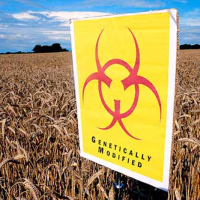Vermont First State to Require Labeling of Genetically Engineered Foods

After years of intense opposition from industry, a U.S. state has finally passed legislation requiring labels on food containing genetically modified organisms (GMO).
Critics of GMO hailed the move by the Vermont legislature, and Democratic Governor Peter Shumlin has promised to sign the bill. That will make Vermont the first state in the nation to have such a law.
“Every Vermonter has a right to know what is in their food,” Democratic Representative Shap Smith, speaker of the Vermont House of Representatives, said in a prepared statement. “Genetically engineered foods potentially pose risks to human health and the environment. I am proud to be the first state in the nation to recognize that people deserve to know whether the food they consume is genetically modified or engineered.”
Shumlin expressed some reservations about the bill, but concluded that passing it was “the right thing to do.” However, the governor predicted industry groups would sue to stop the law from taking effect, scheduled for July 1, 2016. “There is no doubt that there are those who will work to derail this common-sense legislation,” Shumlin said in a press release.
In anticipation of that, the bill requires a special $1.5 million fund be set up to defend against lawsuits filed by the food and biotech industries. The money is expected to come from private donations, settlement proceeds, and appropriations from the state.
The legislation passed by a 113-40 vote, and Rep. Tom Koch, a Republican, was among the minority who opposed it. “What I do not support is Vermont sticking its neck out, again, all alone,” he said. “Frankly, I find it embarrassing and a bad precedent to have our great state pass the hat to support the laws we enact.”
Indeed, the biotech and food industries not only have worked at the state level to block these bills, but also have lobbied Washington to adopt federal legislation that would preempt all state action on the matter.
If Vermont’s law survives a legal challenge and goes into effect, residents are likely to see labels on most foods found in grocery stores. That’s because the Grocery Manufacturers Association estimates about 80% of store-bought foods contain ingredients made from GMO crops.
Proponents of food labeling have been trying throughout the U.S. to adopt laws to better inform consumers about GMOs in the products they purchase. Twenty-nine other states have introduced measures similar to Vermont’s this year.
Two New England states, Connecticut and Maine, had previously approved laws requiring labeling. But those measures contained provisions requiring that neighboring states also pass such laws before those in Connecticut and Maine go into effect. Vermont’s action will not result in these two other laws being implemented. In the case of Connecticut, the law also requires that other states approving food labeling have a combined population of 20 million people. Vermont’s total population is only 626,000.
More than 60 countries around the world currently require such labeling.
-Noel Brinkerhoff
To Learn More:
Vermont Will Require Labeling of Genetically Altered Foods (by Stephanie Strom, New York Times)
Vermont Moves toward Labeling of GMO Foods (by Lisa Rathke and Dave Gram, Associated Press)
Vermont Will Be First State in Nation to Require GMO Labeling (by John Herrick, VTDigger.org)
Connecticut’s New Law Ordering Labeling of GMO Foods not as Big a Deal as it Seems (by Noel Brinkerhoff, AllGov)
- Top Stories
- Unusual News
- Where is the Money Going?
- Controversies
- U.S. and the World
- Appointments and Resignations
- Latest News
- Musk and Trump Fire Members of Congress
- Trump Calls for Violent Street Demonstrations Against Himself
- Trump Changes Name of Republican Party
- The 2024 Election By the Numbers
- Bashar al-Assad—The Fall of a Rabid AntiSemite






Comments